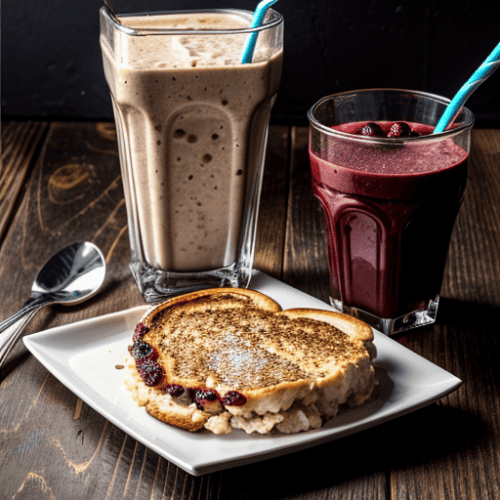As we know, breakfast is considered the most important meal of the day since it jumpstarts your day with the nutrition and energy you need. Lately, however, many are taking their daily protein shake for breakfast in lieu of the usual meal and seeing optimal results.
But is a protein shake good for breakfast? This article will discuss why it could be soâ¦
- Is a protein shake good for breakfast?
- What Is A Protein Shake?
- Benefits Of Having Protein Shakes for Breakfast
- Comparing Protein Shakes With Other Breakfast Options
- Customizing Your Protein Shake
- Protein and Satiety: How Protein Shakes Help You Feel Full
- Potential Drawbacks and Considerations
- Frequently Asked Questions (FAQs)
- Conclusion
Is a protein shake good for breakfast?
What Is A Protein Shake?
Protein shakes are the most common protein-based fix, especially for athletes, bodybuilders, and fitness enthusiasts who require a quick dose of protein after their workouts. Studies show that protein shakes are an effective source of protein for people, particularly those who need more or may not get enough protein from their diets like older adults, vegetarians, and vegans.
There are different types of protein powders:
- Whey – Whey protein is a mixture of proteins separated from the whey, which is the liquid part of milk that separates during cheese production. It’s the most popular type of protein powder and is effective in promoting muscle growth.
- Casein – Like whey, this protein comes from milk and is what gives it its white color. What makes it distinct from whey is its slower digestion time than other proteins, which curbs down appetite and food cravings.
- Egg – A type of protein sourced from eggs. While both egg whites (albumen) and the yolk contain protein, egg whites provide a greater amount of protein, though the yolk has a greater concentration.
- Plant-based proteins – Plant-based sources of proteins include soy, peas, beans, hemp, seeds, and rice.
Protein Shakes vs Meal Replacement Shakes
While protein shakes and meal replacement shakes may sound the same, both contain protein and are loaded with nutrients and minerals, but they actually differ in nutritional composition and their different goals. Here’s how they fare against each other:
Meal replacement shakes are designed to:
- Help with weight control
- Contain more fiber, calories, and carbohydrates than protein shakes
- Substitute one or two meals
While protein drinks are more often used for:
- Improving athletic performance
- Gaining muscle mass
- Works only as a meal supplement and does not replace a meal.
- To be consumed before or after a workout.
In short, protein shakes should only supplement meals, meal-replacement shakes can replace them. Confusing their usage could interfere with your weight management goals.
Benefits Of Having Protein Shakes for Breakfast

Protein shakes can serve as a quick and convenient breakfast option that can help provide some extra nutrients to your diet.
Muscle repair and growth
Taking protein shakes can help maintain muscle mass and promote muscle growth and show a significant rise in muscle protein synthesis especially when doing strength training. It can also speed up recovery from injuries and help your tired muscles bounce back even stronger after a workout.
Satiety and weight management
Protein provides more satiety with less food, so you won’t feel the urge to eat as often. It does so by reducing levels of ghrelin, the hunger hormone, and increasing peptide YY levels, which is a hormone that makes you feel full.
Apart from reducing one’s appetite, taking a healthy amount of protein shakes can boost metabolism and changes several weight-regulating hormones. One study attests that protein consumption in the morning can therefore help reduce a person’s overall calorie intake and aid weight loss efforts. Its results revealed that a protein shake for breakfast is more effective at reducing levels of the hunger hormone ghrelin than a high-carb breakfast.
Another study showed whey protein’s potential in preventing obesity and Type 2 diabetes
Convenience and ease of preparation
Protein shakes can be a quick and convenient alternative if you don’t have enough time to prepare a meal and have it as a breakfast that you can consume quickly. You only need to either shake or blend it and you’re good to go.
But that’s not to say that protein shakes can substitute breakfast completely since they’re supplements. Having a small meal is always recommendable if not required to not build a dependency on protein shakes.
Comparing Protein Shakes With Other Breakfast Options
Here’s how protein shakes compare with common breakfast foods in terms of nutritional quality and suitability for various goals. We’ll use whey protein powder since it’s the most common protein powder type comparison.
Eggs vs. Protein Shakes
Both eggs and protein powder (e.g. whey) are highly bioavailable and have a complete amino acid profile. But a 2018 study showed that whey protein has a higher proportion of the branched-chain amino acids (BCAAs) leucine, isoleucine, and valine, which are directly involved in muscle protein synthesis, making it more ideal for muscle growth.
Winner: Protein Shakes
Oatmeal vs. Protein Shakes
USDA and NIH data from 2020 shows that both oatmeal and whey protein shakes are high in calcium, calories, dietary fiber, potassium, and protein, but with varying levels. For example, whey protein is higher in protein, potassium, and vitamins, while oatmeal contains more iron and dietary fiber, with a lesser cholesterol content.
Winner: Protein Shakes
Greek Yogurt vs. Protein Shakes
While both Greek yogurt and protein shakes are high in calcium and protein, whey protein shakes contained more B-complex vitamins, dietary fiber, and potassium.
Winner: Protein Shakes
Whole Wheat Bread vs. Protein Shakes
Protein shakes are considerably richer in protein and most B-complex vitamins than whole wheat bread, though the latter is richer in iron, pantothenic acid, and folate.
Winner: Protein Shakes
Customizing Your Protein Shake
You can create a protein shake according to your taste, preferences, or dietary restrictions. When choosing a protein powder, you can opt for whey, casein, soy, or egg protein shakes if you’re not under dietary restrictions or have allergies. Plant-based options like peas, rice, hemp, and other seed proteins are great alternatives for vegans, vegetarians, and those with food allergies.
You can also add other ingredients like fruits, grains, seeds, eggs, cereals, or oats to your protein shake to give in an added boost of flavor or nutrients. Customizing your protein shake also gives you the freedom to adjust sweetness levels or mix it with other
How To Make a Protein Shake for Breakfast
Here’s a sample protein shake recipe mix you can try:
Ingredients
- 1 or 2 scoops of protein powder (depending on the recommended dosage)
- 1 cup of fresh blueberries (or any fruit of your choice)
- 1 scoop of chia seeds
- 300ml of water or unflavored soy milk
Instructions
- Put all the ingredients in a blender. Pour the liquid fix to prevent the powder from sticking to the bottom.
- Blend for up to 15 seconds
- Pour into a shaker or bottle. Enjoy before or after a workout.
If you don’t have a blender with you, you can simply shake them with a shaker or a canteen bottle. Make sure to crush the fruits in advance before shaking the mix.
Protein and Satiety: How Protein Shakes Help You Feel Full
Understanding Satiety
Satiety is the satisfied feeling of being full after a meal. Studies show that healthy satiety changes meal patterns to turn on your appetite control. In that way, such habits help people feel fuller and naturally reduce their food intake and improve their overall health
The Role of Protein in Satiety
Protein largely contributes to feelings of fullness. Consuming protein-rich foods like meats, poultry, fish, beans, nuts, and yogurt, which are replete with nutrients that are extremely effective in activating healthy satiety.
Studies also show that protein generally increases satiety to a greater extent than macronutrients such as carbohydrates or fat, and can benefit weight management goals.
Protein Shakes and Satiety
Proteins increase satiety by decreasing levels of the hunger hormone ghrelin and increasing peptide YY levels, which is a hormone that gives the sensation of being full. Research shows that taking protein shakes in the morning can help reduce calorie intake and aid weight loss efforts.
Practical Tips for Making Protein Shakes More Filling
Protein shakes can be customized and loaded with other ingredients to make them more filling. Fiber-rich foods like bananas, apples, and oats can be added for extra benefit and flavor, as well as blueberries, chia seeds, and almonds.
Make sure to follow the recommended dosage to prevent possible bloating and other stomach problems.
Potential Drawbacks and Considerations
Protein shakes are generally safe when taken under the recommended daily amounts. However, when consumed in excess, it may cause the following side effects:
- Bloating
- Nausea
- Fatigue
- Headaches
- Reduced appetite
- Increased bowel movements
Protein sources like egg, nut, soy, and milk (whey and casein) may cause allergic reactions in people with such allergies and intolerances against them. Some protein powders also contain high amounts of sodium, which can cause bloating and retain body fat. Pea proteins, for example, are notoriously high in sodium due to their extraction process.Â
Here is a list of low-sodium protein powders to help you avoid that issue.
Before selecting a protein powder brand, make sure the protein type and nutritional labels suit your health needs and dietary preferences.
Frequently Asked Questions (FAQs)
Is a protein shake enough for breakfast?
A protein shake for breakfast is a good way to get kickstarted with a boost of nutrients to last the day. Though having a small meal is still recommendable.Â
Can a protein shake replace a meal?
While a protein shake can be taken for breakfast, it’s not a complete meal substitute as it’s intended to be only a food supplement. Only meal replacement supplements can get to substitute for one or two meals.
What is the best time to have a protein shake?
Protein shakes can be taken as a breakfast, but it’s more generally taken before or after a workout.Â
Can I lose weight by having a protein shake for breakfast?
Having a protein shake in the morning reduces a person’s overall calorie intake and aids weight loss effort, but further study is needed to establish these facts.Â
Are protein shakes suitable for building muscle?
Protein shakes, especially when paired with a healthy diet, can help promote optimal muscle synthesis and recovery after strength training.
Recap
- Protein shakes help athletes, bodybuilders, and fitness enthusiasts get a quick dose of protein before or after workouts and help those who don’t get enough protein from their diets like older adults, vegetarians, and vegans
- Protein shakes can be a quick breakfast option that can help provide some extra nutrients to your diet. But it should never substitute a meal completely.
Conclusion
People drink protein shakes to gain weight, build muscle, or have better physical performance during workouts. They can serve as a quick breakfast option and can greatly benefit weight control/management, but being supplements, they should never completely substitute a healthy, balanced diet and should still be treated as a supplement, to ensure a clean bill of health and meet fitness goals better.
Disclaimer: this article does not constitute or replace medical advice. If you have an emergency or a serious medical question, please contact a medical professional or call 911 immediately. To see our full medical disclaimer, visit our Terms of Use page.










